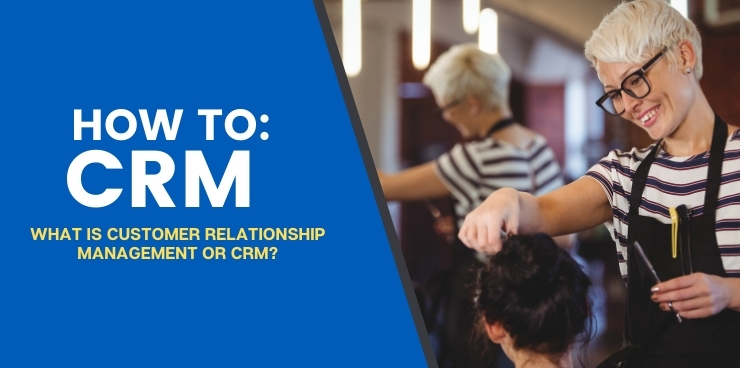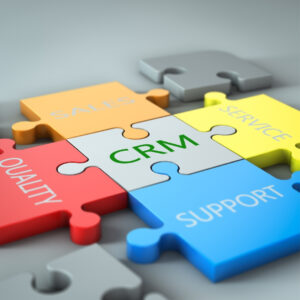What is Customer Relationship Management (CRM)? [+Examples]
Every business needs to take the necessary actions to ensure customer satisfaction. The customer experience directly determines whether they do business with you again and tell their colleagues to do the same. Customer relationship management oversees all your business interactions to manage them appropriately.
A customer relationship management system aims to improve customer-business relationships to keep customers satisfied and grow your business.
What Does CRM Stand for?
CRM stands for customer relationship management. CRM systems take various forms and include technology, strategies and practices to improve customer satisfaction and CRM databases contain information regarding the customer experience. A functioning CRM system helps your business stay connected with customers, improve customer satisfaction and increase profitability.
Who CRM Targets
CRM systems help everyone in your organization gain a better grasp on how customer interactions lead to success. Sales teams can operate with a better understanding of who they sell to. Recruiters can hire talent already well-suited toward the customer experience. Sales management teams can help institute new practices and goals.
Everyone benefits from a CRM system, including the customer. CRM platforms increase visibility relating to customer actions and interactions. Team members better informed on customer habits perform more effectively in the field.
Customers benefit from a team that functions as a cohesive unit with information sharing and resource pooling. The more streamlined your processes, the less friction a customer faces when making a purchase and receiving information.
The Importance of CRM
CRM systems give all businesses a distinct advantage over operating without them. In order for your business to survive, you need to put the customer first. CRM allows you to understand your customers in a tangible way. CRM applications continue to lead as one of the most popular forms of business software.
With the competition actively working to better understand their customers, your business must do the same. A crude type of customer relationship management might take the form of a survey. However, surveys cannot accurately measure all points of data. Only a customer relationship management software system gives you detailed buying habits, customer responses and order statuses.
Your teams can access all data from your CRM system on a customizable, easy-to-navigate dashboard. No more running around trying to find all pieces of data related to one customer’s buying journey. Now it is all in one place.
What Does a CRM System Do?
A CRM system essentially captures all data related to the customer buying experience. Analytics allows for a greater understanding of what the customer does during each of the sales pipeline stages. CRM determines what attracted a lead, what they bought and what they might have said about the product.
CRM not only compiles all of this data, but it makes it easily accessible across your company. Using a convenient dashboard, the CRM processes are available to all members of your team. Instead of wasting time hunting for data, a CRM system revolutionizes the way your team interacts with it.
Ways a CRM System Can Help Your Business
All types of businesses can improve with a customer relationship management system. You can use CRM for small businesses, B2B commerce and everything in between. No matter your size or industry, you should use CRM processes to drive your sales beyond expectations. Some of the many CRM solutions include:
1. Connecting your Business’ Information Silos
When one of your team members needs a piece of information, the faster they receive it the better their productivity. Unfortunately, many businesses struggle with connecting their information silos for easy access. A CRM system can better integrate your silos and connect your information to one platform.
With the right CRM tools, your employees can retrieve information from several different departments. No more unnecessary searching or digging. And when they can find something easier, they do not slow down the other departments either. Everyone can work together much more efficiently.
 2. Increasing Lifetime Customer Value
2. Increasing Lifetime Customer Value
A greater understanding of your customers’ habits allows you to open more opportunities. Upselling and cross-selling opportunities will appear to your sales team to better capitalize on a sale. You become your customers’ one-stop shop for all their needs and further develop a profitable relationship.
CRM also helps you understand what keeps your customers satisfied. When a customer enjoys doing business with you, they will keep coming back. Hopefully, they will even tell their friends to do business with you as well.
3. Improving your Bottom Line
CRM can totally transform your business’ performance. From converting leads into sales to achieving a higher return on marketing investments, CRM systems do it all. Your sales team can perform better presentations in line with the customer’s needs to close more often and with larger deals.
CRM marketing helps attract higher-quality leads and convert more leads into customers. On top of better performance from customers, your employees perform better as well. With easy access to the same information, your teams can adapt and implement new strategies quicker. Better organization allows your team to get the most out of their time and focus on driving sales.
4. Improving Products and Services
The CRM experience revolutionizes your business beyond understanding your customers more completely. A CRM system also helps develop a further understanding of your own products and services. With all data collected from customer habits and reviews, you can see which products underperform.
When you see a product or service that does not sell or consistently receives bad reviews, you can alter it. However, you need to find the problem first, which is what a CRM system will do. Once you implement a change, you can analyze its performance in real-time. If something works and your customers like it, you can use it to improve other products or services.
5. Identifying and Categorizing Leads
Sometimes, determining which leads to focus can overwhelm your team. Data points need cross-referencing and the whole thing gets messy very quickly. Fortunately, a CRM system helps with your entire prospecting process. With such a crucial function now performed with more efficiency, it can take your business to new heights.
By comparing attributes between new leads and existing customers, CRM systems enhance your lead scoring method. CRM uses all data points for more accurate results. You can better understand what makes a high-quality lead. From there, your sales team can prioritize the customers most likely to buy.
CRM also allows you to streamline your marketing process in general. By better understanding who buys, you can focus your marketing efforts on these specific markets. Your customer journey mapping will work better than ever.
6. Enhancing Customer Support
CRM allows you to implement a better functioning customer management system. As soon as a customer reaches out with a concern, you can have the right team member respond. If a customer complains about a certain product or service, an employee familiar with it should provide support.
You can reach out as soon as a customer needs help with a chosen representative. When customers can rely on customer support, they will keep coming back.
7. Looking Ahead
As your business and industry change with the times, you need to evolve in order to survive. More than anything, a CRM system helps keep all facets of your business better connected. No matter where your teams operate from, they can work together on the same project. The cohesiveness of your business determines whether you can survive in a changing environment.
 Top 5 Most Successful Examples of CRM Implementation
Top 5 Most Successful Examples of CRM Implementation
Alright, so you have heard the benefits of a CRM system. Now you need proof. Look no further than these five successful examples of CRM implementation. You can follow in these companies’ footsteps and drive your own business to succeed.
1. Amazon CRM
Amazon’s booming business model has made them a titan for online shopping. And they have their wonderful customer relationship management system to thank. Amazon uses a CRM system to capture oodles of customer data, from their clicks to their purchases. The resulting information allows Amazon to tailor its website experience to each customer’s needs and interests.
Like social media sites, Amazon’s front page changes for every customer. They also send their customers email promotions based on their purchases. Coupled with a functional customer service department and frictionless buying experience, Amazon gets the most out of its CRM system.
2. Coca-Cola CRM
Coca-Cola uses a CRM system to stay in touch with customers to deal with concerns as soon as they arise. All sales teams and customer service representatives have access to customer data. That way, they can see what a customer needs and tailor the customer’s experience accordingly.
Coca-Cola also uses CRM to improve its marketing tactics. By analyzing customer reactions, including reviews and social media interactions, sales teams can offer the right promotions. A Coca-Cola team member can access the CRM database no matter their location through a mobile app. Staying up to date and informed allows their teams to match customers’ needs and fulfill orders.
3. Tesco CRM
Following the path of many retailers, Tesco makes use of Clubcard to reward returning customers. Each time a customer makes a purchase, they receive a certain number of points. Customers can exchange these points for rewards, incentivizing their return. Tesco offers many variations on their standard club to cater to specific groups, such as children and families.
Meanwhile, Tesco compiles customer data from these sales to create a more customized experience. Using this data, they send out mail and email promotions based on a customer’s purchase history. When customers receive a promotion angled towards their preferences, they tend to buy more often.
4. Apple CRM
In the tech world, Apple reigns supreme with its returning customers. With each purchase, customers must register with an Apple ID. Many of Apple’s applications on their devices require an Apple ID account to use. Apple uses information from these applications and purchases to tailor specific marketing campaigns.
They also famously utilizes something called the “Apple ecosystem.” Apple’s line of accessories, including headphones and smartwatches, work seamlessly with their iPhones and laptops. Apple can gather data from device purchase history to cross-sell to existing customers. CRM also allows Apple to upsell new releases to customers in need of an updated device.
The overall experience has tons of benefits for their customers as well by resulting in a frictionless experience. Customers receive information related to products and services they actually enjoy, turning marketing into convenient shopping.
5. Activision CRM
In the video game industry, Activision has seen tremendous results after implementing a CRM system. Activision extends its customer management to social media platforms to better connect with customers. With a cloud-based CRM system, Activision broke new ground to improve its customer experience.
The CRM system implemented by Activision boasted improvements for both the company and its customers. The company reduced operating costs significantly with a more efficient workforce. It saved around 25 percent on its customer service solutions. With an online service system, they solved more than 80 percent of customer issues through an online platform without a representative.
Customer satisfaction rates increased significantly with the CRM system. Community communication increased through its online and social media channels, connecting customers to the business.
Integrating CRM
The benefits of a functioning customer relationship management system extend to businesses of all categories. Your business benefits by working together more effectively. Customers see customized promotions related to their particular interests. Both sides can save money and further enjoy working together.
If you need help integrating a CRM system into your business, Selling Revolution can help. We specialize in increasing leads, improving sales training and helping businesses recruit top talent. Finding the right CRM system for your business allows you to get the most out of your investment.
Book a 20-minute introductory call with Selling Revolution today. Professional consultation helps push your business in the right direction. Get started today and start driving your business toward the success you deserve.



 2. Increasing Lifetime Customer Value
2. Increasing Lifetime Customer Value Top 5 Most Successful Examples of CRM Implementation
Top 5 Most Successful Examples of CRM Implementation